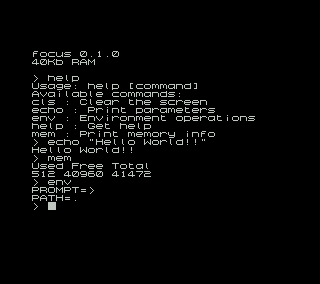| cosam.org |
Focus Homepage

Introduction
Focus (a Free OS for Computers with Unimpressive Specifications) is (or will be) an open source project to develop an operating system for low-spec and homebrew computers.
The plan is to make a portable and highly configurable OS, so the majority is
written in C, with a little assembly for really low-level stuff. Although the
idea was always to run Focus on my
homebrew Z80 system,
the first release is being developed for the Sinclair ZX Spectrum. Not only can
I then re-use most of the code for my own Z80-based system, but the OS can be
compiled and run under a readily available emulator, as shown in the screenshot
to the right. I've also made a
short demo video
(about 150KB) using the
RealSpectrum ![]() emulator.
emulator.
Latest News - Verison 0.1.0 Available
I've made this very early pre-alpha release available, which does very little other than demonstrate the basic kernel framework. At the moment, the following things are working (to a degree!)...
Interrupt handling
Memory management
Virtual File System
Specturm Device Drivers
Shell Interface
If you'd like to be kept informed with updates, please send mail to steve@cosam.org and I'll add your address to the mailing list.
Downloads
You can find the latest sources in the source code repository. The following are also provided for your convenience:
- Snapshot of the sources (possibly outdated).
- Compiled binary image for use with a ZX Spectrum emulator.
Features
Although a minimal operating system, Focus will provide a stripped down POSIX-ish API featuring most of the system calls familiar to C programmers of Unix or Windows systems.
The most likely scenario is that the first release will be a single user, single processing system. The aim is to get at least something resembling decent multi-processing in there as soon as possible.
Focus adopts the Unix "everything's a file" principal to a certain degree, meaning you can open, close, read to and write to devices as if they were regular files. The current design does however use a more AmigaDOS-like approach to device and volume naming, and there's no mounting necessary. The OS uses a virtual file system; modular device drivers can be plugged into this to offer great flexibility.
Memory management in the initial release is handled with the so-called "buddy system", which avoids fragmentation and yet doesn't need thousands of lines of code. Seeing as the Spectrum doesn't have hardware support for paging or memory protection, this has been left for a later release. Focus will however preform regular checks on various boundries, so you'll be warned if, for example, the stack starts threatening your data.
Tools
The tools I'm using for development at the moment are:
-
SDCC

This open source C compiler targets the Z80 and Intel 8051 CPUs, and others are planned to follow in the future. It can be run on Linux or other Unix systems, or even under Windows using Cygwin .
.
-
RealSpectrum

A great Spectrum emulator, which also features a handy debugger tool and even video capture! The standard ROMs are easily replaced with your own images. -
Hex2Bin utility

Required to convert SDCC's output into a binary image for use in the emulator, or indeed a real computer!. (If you have trouble with it, delete the executable and run 'make' to recompile it.)